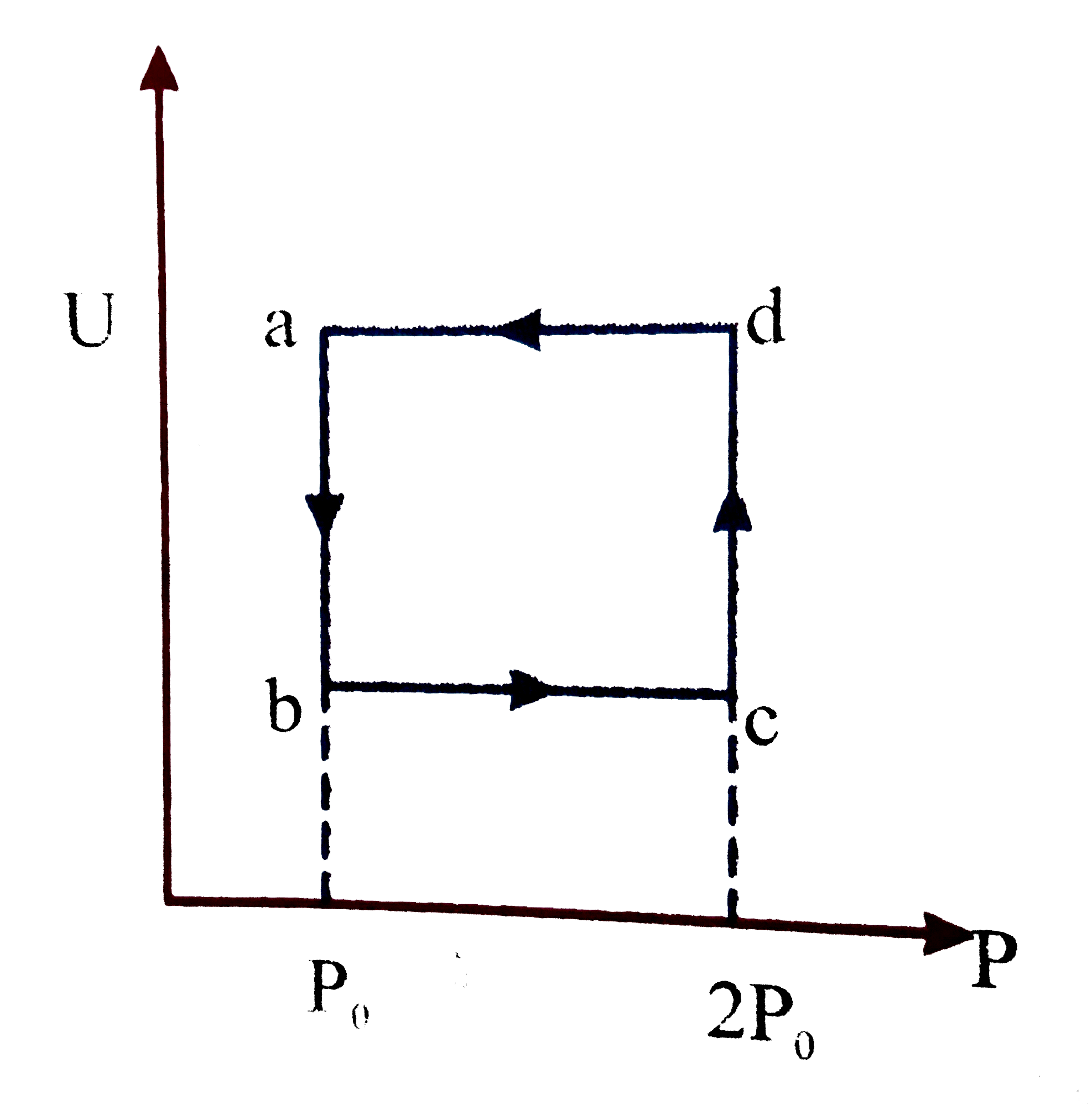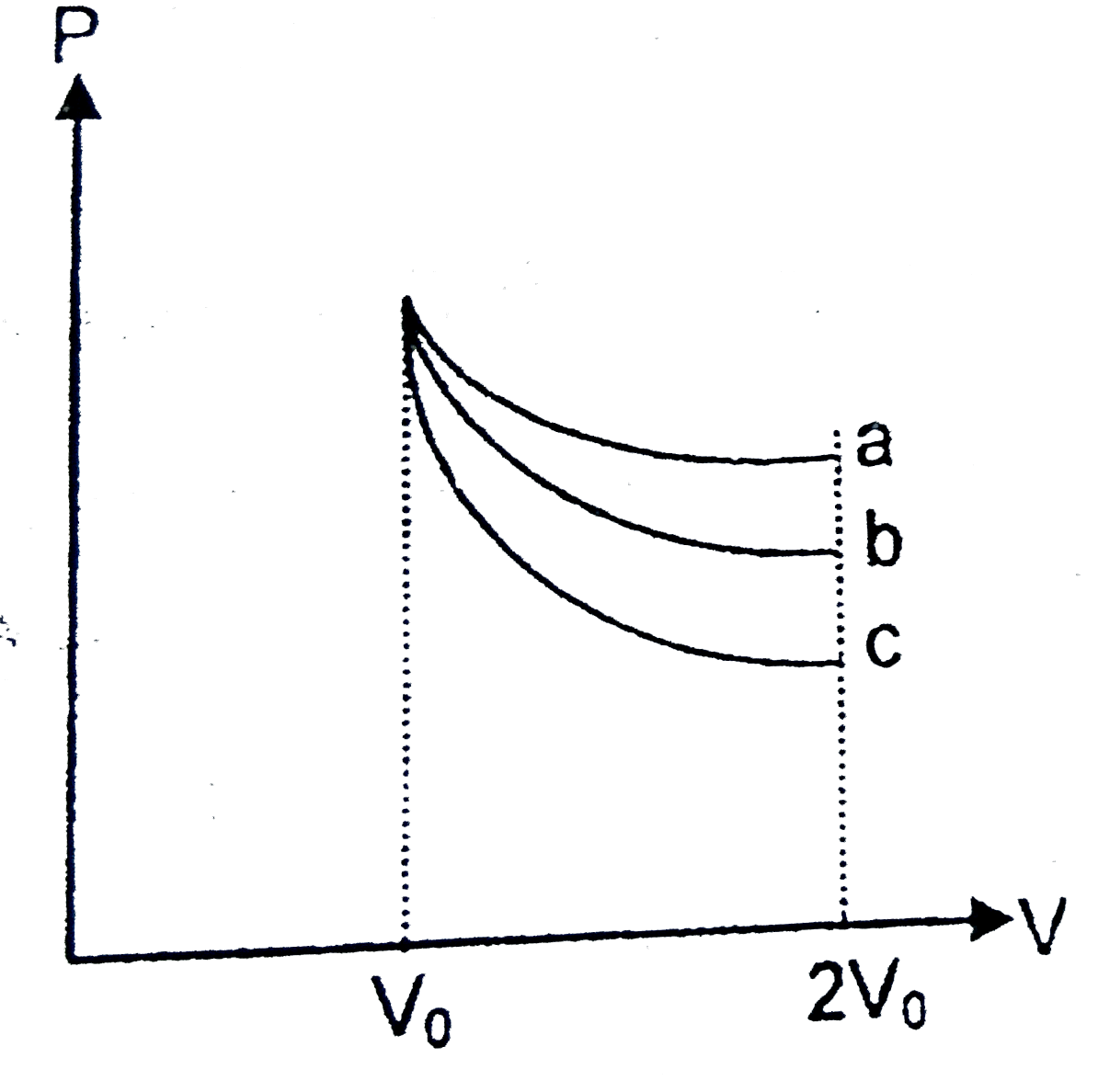The internal energy of a gas is given by . It expands from to against a constant pressure . The heat absorbed by the gas in the process is :-
The correct Answer is:B
To solve the problem, we need to find the heat absorbed by the gas during its expansion from volume V0 to 2V0 against a constant pressure P0.
1. Identify the Change in Internal Energy (ΔU):
The internal energy of the gas is given by the equation:
U=5+2PV
Since the pressure is constant at P0, we can express the change in internal energy as:
ΔU=Ufinal−Uinitial
where Uinitial=5+2P0V0 and Ufinal=5+2P0(2V0).
Calculating these:
Uinitial=5+2P0V0
Ufinal=5+4P0V0
Therefore, the change in internal energy is:
ΔU=(5+4P0V0)−(5+2P0V0)=2P0V0
2. Calculate the Work Done (W):
The work done by the gas during expansion at constant pressure is given by:
W=PΔV
Here, ΔV=Vfinal−Vinitial=2V0−V0=V0.
Thus, the work done is:
W=P0×V0
3. Apply the First Law of Thermodynamics:
The first law of thermodynamics states:
Q=ΔU+W
where Q is the heat absorbed by the gas. Substituting the values we calculated:
Q=ΔU+W=2P0V0+P0V0
Combining these gives:
Q=3P0V0
Final Answer:
The heat absorbed by the gas in the process is:
Q=3P0V0
The internal energy of the gas is given by the equation:
U=5+2PV
Since the pressure is constant at P0, we can express the change in internal energy as:
ΔU=Ufinal−Uinitial
where Uinitial=5+2P0V0 and Ufinal=5+2P0(2V0).
Uinitial=5+2P0V0
Ufinal=5+4P0V0
Therefore, the change in internal energy is:
ΔU=(5+4P0V0)−(5+2P0V0)=2P0V0
The work done by the gas during expansion at constant pressure is given by:
W=PΔV
Here, ΔV=Vfinal−Vinitial=2V0−V0=V0.
Thus, the work done is:
W=P0×V0
The first law of thermodynamics states:
Q=ΔU+W
where Q is the heat absorbed by the gas. Substituting the values we calculated:
Q=ΔU+W=2P0V0+P0V0
Combining these gives:
Q=3P0V0
The heat absorbed by the gas in the process is:
Q=3P0V0
Topper's Solved these Questions
- GEOMETRICAL OPTICSBook:ALLENChapter:GEOMETRICAL OPTICSExercise:EXERCISE -02
Explore 82 Videos
- GEOMETRICAL OPTICSBook:ALLENChapter:GEOMETRICAL OPTICSExercise:EXERCISE -03
Explore 11 Videos
- GEOMETRICAL OPTICSBook:ALLENChapter:GEOMETRICAL OPTICSExercise:SOME WORKED OUT EXAMPLES
Explore 84 Videos
- CURRENT ELECTRICITYBook:ALLENChapter:CURRENT ELECTRICITYExercise:All Questions
Explore 427 Videos
- GRAVITATIONBook:ALLENChapter:GRAVITATIONExercise:EXERCISE 4
Explore 9 Videos
Similar Questions
The internal energy of a gas is given by U=1.5pV. It expands from 100cm2 to 200cm3 against a constant pressure of 1.0×105Pa. Calculate the heat absorbed by the gas in the process.
View SolutionThe internal energy of a gas is given by U=1.5pV. It expands from 100cm2 to 200cm3 against a constant pressure of 1.0×105Pa. Calculate the heat absorbed by the gas in the process.
View Solution
Knowledge Check
The internal energy of a gas is given by U = 3 pV. It expands from V0 to 2V0 against a constant pressure p0.
The heat absorbed by the gas in the process isAp0V0B2p0V0C3p0V0D4p0V0The internal energy of a gas is given by U=2pV. It expands from V0 to 2V0 against a constant pressure p0. The heat absorbed by the gas in the process is
A(a) 2p0V0B(b) 4p0V0C(c) 3p0V0D(d) p0V0The internal energy of a gas is given by U = 3 pV. It expands from V0 to 2V0 against a constant pressure p0.
What is the value of γ(=CP/CV) for the given gas?A1.33B1.4C1.67DNone of these
Figure shows the variation of internal energy (U) with the pressure (P) of 2.0 mole gas in cyclic process abcda.The temperature of gas at c and d are 300and500K respectively. The heat absorbed by the gas during the process is X×10Rln2 . Find the value of x.

View Solutionwhen a gas expands from 1. 5L to 6.5 L againt a constant pressure of 0.50 atm and during process , the gas also absorbs 100 J of heat. The change in internal energy is
View SolutionAn ideal gas may expands from V0 to 2V0 according to following three processes. Molar specific heat for processes b will be

View SolutionThe internal energy of an ideal diatomic gas corresponding to volume V and pressure P is U=2.5PV. The gas expands from 1 litre to 2 litre at a constant pressure of one atmosphere. The heat supplied to the gas is
View SolutionA gas expands under constant pressure P from volume V1 toV2The work done by the gas is
View Solution